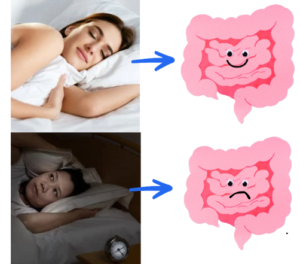Understanding the Vital Connection Between Quality Sleep and Digestive Health
Sleep serves a purpose far beyond mere rest; it is an essential function that profoundly impacts our digestion. Although the link between sleep and digestive wellness might not be immediately obvious, it entails a series of intricate physiological processes that work synergistically. The body's circadian rhythm, often referred to as the internal body clock, synchronises both sleep cycles and digestive processes. This synchronisation is a primary reason why individuals frequently experience hunger at consistent times each day, showcasing how our bodies are finely tuned to natural biological cycles.
Recognising the Importance of Restful Sleep for Digestive Functionality 
Sleep is a critical component for the body’s ability to heal, rejuvenate, and restore itself effectively. The deeper stages of sleep hold particular significance for these restorative processes. During these profound phases, the organs, tissues, and cells that constitute the digestive system not only relax but also engage in crucial repair mechanisms. The body prioritises cellular repair and regeneration during deep sleep, particularly the restoration of cells lining the digestive tract. These cells endure constant wear and tear due to exposure to food particles and digestive enzymes. This regeneration is vital for maintaining the integrity of the gastrointestinal lining, which in turn enhances the efficiency of digestion.
Deep sleep also plays a significant role in strengthening the immune system, which is especially crucial for the digestive system as it harbours its own specialised immune cells. These cells are activated by the beneficial bacteria residing within the gut, which are essential for defending the gut and the entire digestive system against harmful microorganisms. Consequently, maintaining a balanced population of bacteria within the gut environment is imperative for overall health.
Additionally, the organs within the digestive system have a fundamental role in detoxification, aiding in the elimination of waste and harmful substances from the body. Deep sleep enhances this detoxification process by optimising the operational efficiency of the liver and kidneys, allowing these organs to function at their peak. This collaborative interaction between sleep and detoxification plays a significant role in supporting overall digestive health and wellness.
Examining the Relationship Between Gut Motility and Sleep Patterns
A fundamental aspect of digestion is the effective movement of food and waste through the digestive tract, a process referred to as gut motility. This essential process experiences significant alterations during sleep. During both deep and light sleep, the rate of gut motility is notably diminished. This reduction is a necessary adjustment, enabling the digestive system to conserve energy that is redirected towards repairing digestive tissues. By conserving energy, the digestive process can operate more effectively during waking hours, enhancing both nutrient absorption and waste elimination.
The migrating motor complex is a cycle of contractions that takes place during fasting periods, including during sleep. This cycle is crucial for gut motility, as it effectively sweeps away food particles and residual matter that may linger within the digestive system. This natural cleansing mechanism of the digestive tract minimises the risks of bacterial overgrowth, fostering a healthy gut environment. Notably, the migrating motor complex is most actively engaged during the night when individuals are fasting and asleep, underscoring the essential role of sleep in protecting the health of the digestive system.
As dawn approaches, gut motility gradually increases, preparing the digestive system to process and digest food efficiently. This rise in motility can also trigger the first bowel movement of the day, demonstrating the finely tuned connection between sleep and gut motility. Understanding this relationship is essential for optimising digestive health and enhancing overall well-being.
Investigating Hormonal Effects on Sleep and Digestive Processes
Ghrelin, often termed the hunger hormone, plays a significant role in stimulating appetite. In contrast, leptin communicates to the brain that the stomach is full, helping to prevent overeating. Together, these hormones are pivotal in appetite regulation, yet their functions can be adversely affected by insufficient sleep.
Even just one night of poor sleep can elevate levels of ghrelin, which can lead to increased appetite and often result in cravings for carbohydrates. This situation is commonly referred to as feeling ‘hangry’. Compounding the problem, levels of leptin can plummet following a night of inadequate sleep, disrupting the signals that indicate satiety. This creates a challenging scenario where individuals may overindulge and make poor dietary choices while struggling to heed their body's cues to stop eating. While occasional poor sleep may not yield severe consequences, chronic insomnia can lead to significant digestive complications, including inflammation in the gut, liver disorders, gastroesophageal reflux disease, inflammatory bowel disease, and even colorectal cancer, in addition to contributing to weight gain.
The Impact of Sleep Disruption on Digestive Health
Sleep disruptions can lead to a multitude of digestive issues. Factors such as shift work, particularly night shifts, and experiencing jet lag can significantly disrupt sleep patterns and disturb the body’s internal clock. Furthermore, eating late at night or maintaining irregular meal times can adversely affect the quality of sleep. The circadian rhythm that governs sleep is intrinsically linked to natural sunlight, which is crucial for sustaining a healthy sleep-wake cycle.
Regrettably, in our modern technology-driven society, many individuals spend a considerable portion of their daytime indoors, resulting in diminished exposure to natural light. This shift has led to increased exposure to blue light emitted by devices like laptops, televisions, and smartphones, further disrupting the sleep cycle and overall sleep patterns, especially when this exposure occurs shortly before bedtime.
The cumulative effects of these factors can lead to serious digestive issues, including diarrhoea, ulcers, inflammatory bowel disease, or disruption of the delicate balance between beneficial and harmful bacteria within the gut. This imbalance can also compromise the gut lining, complicating the overall situation regarding digestive health.
Enhancing Microbiome Health Through Quality Sleep
The microbiome encompasses trillions of microorganisms residing in the gut, predominantly consisting of beneficial bacteria known as probiotics, along with viruses, fungi, and potentially harmful bacteria. These microbes are not only crucial for overall health but also play a pivotal role in digestive health. They enhance immune responses and aid in digestion, facilitating the production of essential vitamins, enzymes, hormones, and amino acids. Recent studies have underscored a notable association between the microbiome and sleep, indicating that disrupted sleep or chronic insomnia can negatively impact the balance of these microbes, ultimately affecting digestive health and overall wellness.
Unpacking the Complex Interactions Between Microbiome Health and Sleep Quality
The intricate relationship between sleep and microbiome health is both complex and multifaceted. Poor sleep can negatively influence microbiome health, while an imbalanced microbiome can also detrimentally affect sleep quality. To understand this intricate interplay, one study revealed a correlation between a higher abundance of specific bacterial types in the gut and quicker sleep onset, as well as fewer awakenings throughout the night. While this article cannot cover all findings, the essential takeaway is that nurturing a diverse and abundant population of beneficial bacteria within the gut is vital for achieving optimal sleep, effective digestion, and maintaining overall health.
Exploring the Interconnections Between Stress, Sleep, and Digestive Health
A frequent consequence of stress and anxiety is disrupted sleep. Conversely, these mental health challenges can also have detrimental effects on the physical health and functionality of the digestive system. This disruption can lead to altered gut motility and contribute to issues such as indigestion, ulcers, and irritable bowel syndrome. A critical factor in this dynamic is the impact of the so-called stress hormone, cortisol.
Understanding How Cortisol Affects Digestive Processes
When cortisol levels rise, the body reacts by entering a fight-or-flight state. This physiological response redirects blood flow to critical areas such as the heart, brain, lungs, and muscles, while diverting it away from the digestive system. This response prepares the individual to confront danger or escape, a reaction essential for survival during prehistoric times.
In modern times, however, stressors are often less life-threatening, such as financial concerns, work pressures, or insufficient sleep. While the short-term redirection of blood flow may be beneficial in acute situations, chronic stress can have detrimental effects on the digestive system, particularly regarding gut motility. This can manifest in symptoms such as constipation, diarrhoea, indigestion, gas, and bloating. Therefore, implementing effective stress management strategies is essential for supporting both gut health and achieving quality sleep.
Ensuring adequate sleep is crucial for maintaining a healthy digestive system, as the relationship between sleep and digestion is deeply interconnected. Prioritising effective sleep hygiene practices is essential for achieving restorative sleep. This involves minimising exposure to blue light from electronic devices, adhering to a consistent sleep schedule, creating a cool, dark sleep environment, avoiding food intake within two hours before bedtime, and ensuring sufficient exposure to natural light during the day, especially in the morning.
References
Understanding Digestive Health and Circadian Rhythms
Exploring Sleep Dysfunction and Digestive Conditions
Examining the Link Between the Gut Microbiome and Sleep
Investigating Stress and Its Effects on the Digestive System
The Article: How Sleep Affects Your Digestive System appeared first on https://janestevensnutrition.com
The Article: Sleep’s Impact on Your Digestive System Explained appeared first on https://janestevens.net
The Article Sleep’s Impact on Digestive Health Explained Was Found On https://limitsofstrategy.com


Your exploration of the intricate relationship between sleep and digestive health truly resonates with me. It’s fascinating how our bodies are designed to operate in harmony with these cyclical patterns, yet many people overlook the pivotal role that quality sleep plays in overall well-being. Personally, I’ve experienced a significant improvement in my digestive issues after prioritizing better sleep hygiene—something as simple as going to bed and waking up at consistent times has transformed how my body processes food and its rhythms.
It’s interesting to hear how prioritizing better sleep hygiene has had such a positive impact on your digestive health. It really does highlight the interconnectedness of our bodily systems. I’ve been reading up on how our circadian rhythms influence various health aspects, and it’s intriguing to see how something as fundamental as sleep can set the tone for so many processes, including digestion.
I completely agree with you about the interconnectedness of our bodily systems, especially when it comes to sleep and digestion. It’s fascinating to see how our circadian rhythms influence not only our energy levels but also processes like metabolism and appetite. I’ve recently been diving into some research on how irregular sleep can impact our gut microbiome, and the findings are quite revealing.
It’s really interesting that you’re diving into the research on sleep and the gut microbiome; that connection has been popping up more and more in health discussions lately. I’ve read about how our gut health can affect more than just digestion—it can influence our mood and energy levels, too, which ties back to how we sleep.
It’s so true how interconnected sleep and digestion are, and I think a lot of us don’t fully appreciate that until we experience a change ourselves. It sounds like you found a rhythm that really works for you. I remember when I started focusing on consistent sleep times; it felt like I was rediscovering my body’s natural clock.